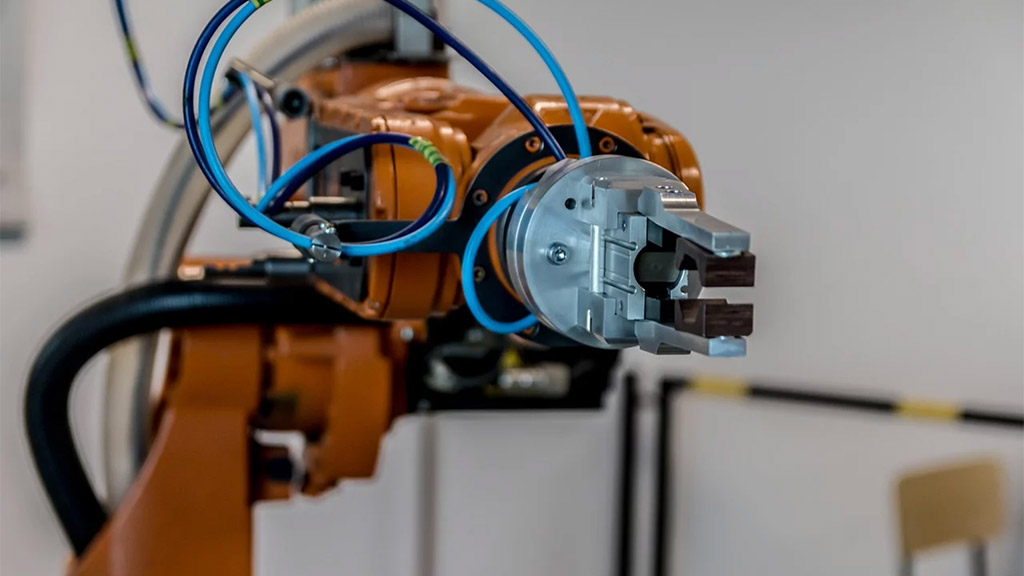Companies that integrate robotics are up to five times more profitable
A recent study has analysed the productivity and output of 1,190 Catalan industrial companies over a period of 25 yearsThe number of robots in these companies has doubled over the last two decades

Their turnover is higher, their sales are higher, they create greater added value and their employees are paid higher salaries. Investing in robotics and promoting innovation is a sure-fire road to success for industrial companies, as revealed in a study by Joan Torrent, and economics lecturer and researcher from the UOC's Faculty of Economics and Business. His study reveals irrefutable evidence regarding how safe, both now and in the future, an investment of this sort is. Having analysed the productivity and output of 1,190 Catalan companies over a 25-year period (1991-2016), Torrent has been able to conclude that those that innovate and use automated systems turn over up to five times more per year than companies that do not. However, despite these findings, the study also reveals that Catalan entrepreneurs do not know how to harness Industry 4.0 to its full potential.
Technological progress is paving the way for companies in Catalonia, where the presence of robots has doubled over the past two decades. In the nineties, just two out of every ten companies (19.3%) had incorporated an automated, robotic process, which rose to four out of ten (39.4%) in 2016. Needless to say, this kind of technology represents a decisive competitive edge, since companies that do not use robotics are 75.5% less efficient than those that do.
Robots are the future, but that doesn't necessarily translate into employee redundancy, another of the conclusions gathered from the UOC researcher's analysis. However, neither does it prove that a greater investment into technology leads to more jobs. The reason for this is that employment shifts over time, meaning that technology may render some roles obsolete in the short term, but will lead to the creation of different roles in the future.
Wasted potential
However, the digitalization and automation of processes that characterizes Industry 4.0 doesn't simply mean spending money on programming and more machines. "Digitalization means adapting companies to new strategical and organizational contexts", Torrent explained. This involves rethinking organizational models from a digital perspective and tailoring the training and aptitudes of the people working alongside these robots, from 9-to--5 employees to the CEO, something that not all companies have been able to manage with the same level of efficiency.
"Relationships of technological complementarity do not translate into improvements in productivity, which suggests there are other areas that can be adapted in order to generate more value to capitalize completely on this digital transformation", Torrent warned. This means that, more often than not, companies are lacking a broader perspective and a more in-depth understanding of new economic realities; even though they combine their investments into robotics and innovation with traditional business, this does not translate into greater output.
Another aspect highlighted by the research and which demonstrates how companies are not performing to their full potential is in an area with the most short- and medium-term sales trajectory: e-commerce. Companies that have already automated their systems show better results in this field and make greater use of it, as one in four people (25.7%) buys online from suppliers and one in ten (10.7%) sells their products online to other companies. However, despite the research, and taking experiences from other countries into consideration, the UOC researcher believes that "the use of e-commerce is still not a marker for increases in efficiency".
Small- and medium- sized businesses are unfashionably late
This study on over one thousand Catalan companies over a period of 25 years shows that not all companies are facing this eruption of new technology in the same way. Torrent has confirmed that small and medium-sized businesses are investing much less in automizing their systems and innovating than bigger companies, which ultimately translates into less return on investment and an increased risk of adopting a dual business model. In other words, we can start to divide companies into those that are able to modernize themselves in the face of technological change (meaning they can continue to increase productivity rates), and those that are falling behind, the majority of which clearly find it difficult to keep up with the pace of technological transformation.
With this in mind, the study concludes that small and medium-sized businesses are being overtaken by this trend and a significant number of them run a high risk of seeing their current business models disappear. To keep this happening, Torrent has advised that such companies make a greater effort to adopt new strategical and organizational contexts and to make better use of technology. Similarly, he has also recommended that governments create public policies that address these challenges more integrally. "Few things are more progressive than empowering SMEs to ride this new wave of digitalization", the study's author surmised.
The research has been published in the latest issue of Nota d'Economia, a journal published by the Government of Catalonia's Ministry of the Vice-presidency and of the Economy and Finance, dedicated to the digital era.
Experts UOC
Press contact
-
Editorial department
